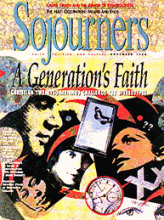For many religious peace and justice organizations, the invited invasion of Haiti has posed a dilemma: a clash between the commitment to nonviolence and the hunger for justice.
Prior to the Jimmy Carter-negotiated pact that led to the uncontested U.S. military occupation, most—but not all—peace groups opposed armed intervention in Haiti. In doing so, they found themselves as uncomfortable allies with people who opposed intervention on the grounds that Haitians "aren’t worth a drop of American blood."
"It was difficult to hang on to our commitment to a nonviolent solution and to be able to say in an equally loud voice, ‘We are opposed to military intervention precisely because we care so much about the people of Haiti,’" said Nancy Nye, legislative secretary for the Friends Committee on National Legislation.
In the days following the insertion of American forces, the emotions of peace people "have gone up and down drastically," according to Haiti solidarity activists, from initial grave apprehension at the terms of the Carter pact to cautious optimism as the occupation played itself out in the streets of Port-au-Prince and Cap-Haitien.
Many Haitians felt as if they had been "kicked in the stomach" by the Carter agreement, according to Gordon Zook, the Mennonite Central Committee country representative for Haiti. "It felt like they’d been sold out again from the top" because the pact appeared to preserve the power of the Haitian military and treated as "honorable" those most responsible for the abuses of the past three years.
Read the Full Article
